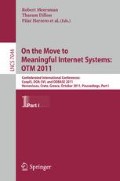Abstract
In open multi-agent systems trust is necessary to improve cooperation by enabling agents to choose good partners. Most trust models work by taking, in addition to direct experiences, other agents’ communicated evaluations into account. However, in an open multi-agent system other agents may use different trust models and as such the evaluations they communicate are based on different principles. This article shows that trust alignment is a crucial tool in this communication. Furthermore we show that trust alignment improves significantly if the description of the evidence, upon which a trust evaluation is based, is taken into account.
Access this chapter
Tax calculation will be finalised at checkout
Purchases are for personal use only
Preview
Unable to display preview. Download preview PDF.
References
Jøsang, A., Ismail, R., Boyd, C.: A survey of trust and reputation systems for online service provision. Decision Support Systems 43(2), 618–644 (2007)
Conte, R., Paolucci, M.: Reputation in Artificial Societies: Social beliefs for social order. Kluwer Academic Publishers (2002)
Castelfranchi, C., Falcone, R.: Trust Theory: A Socio-cognitive and Computational Model. Wiley (2010)
Koster, A.: Why does trust need aligning? In: Proc. of 13th Workshop “Trust in Agent Societies”, Toronto, pp. 125–136. IFAAMAS (2010)
Euzenat, J., Shvaiko, P.: Ontology matching. Springer, Heidelberg (2007)
Schorlemmer, M., Kalfoglou, Y., Atencia, M.: A formal foundation for ontology-alignment interaction models. International Journal on Semantic Web and Information Systems 3(2), 50–68 (2007)
Teacy, W.T.L., Patel, J., Jennings, N.R., Luck, M.: Travos: Trust and reputation in the context of inaccurate information sources. Journal of Autonomous Agents and Multi-Agent Systems 12(2), 183–198 (2006)
Şensoy, M., Zhang, J., Yolum, P., Cohen, R.: Context-aware service selection under deception. Computational Intelligence 25(4), 335–366 (2009)
Pinyol, I., Sabater-Mir, J.: Arguing About Reputation: The lRep Language. In: Artikis, A., O’Hare, G.M.P., Stathis, K., Vouros, G.A. (eds.) ESAW 2007. LNCS (LNAI), vol. 4995, pp. 284–299. Springer, Heidelberg (2008)
Casare, S., Sichman, J.: Towards a functional ontology of reputation. In: AAMAS 2005: Proc. of the Fourth International Joint Conference on Autonomous Agents and Multiagent Systems, Utrecht, The Netherlands, pp. 505–511. ACM (2005)
Nardin, L.G., Brandão, A.A.F., Muller, G., Sichman, J.S.: Effects of expressiveness and heterogeneity of reputation models in the art-testbed: Some preliminar experiments using the soari architecture. In: Proc. of the Twelfth Workshop Trust in Agent Societies at AAMAS 2009, Budapest, Hungary (2009)
Brandão, A.A.F., Vercouter, L., Casare, S., Sichman, J.: Exchanging reputation values among heterogeneous agent reputation models: An experience on art testbed. In: Proc. of the 6th International Joint Conference on Autonomous Agents and Multiagent Systems (AAMAS 2007), Honolulu, Hawaii, pp. 1047–1049. IFAAMAS (2007)
Abdul-Rahman, A., Hailes, S.: Supporting trust in virtual communities. In: Proceedings of the 33rd Hawaii International Conference on System Sciences, vol. 6, pp. 4–7 (2000)
Regan, K., Poupart, P., Cohen, R.: Bayesian reputation modeling in e-marketplaces sensitive to subjectivity, deception and change. In: Proceedings of the 21st National Conference on Artificial Intelligence (AAAI), Boston, MA, USA, pp. 1206–1212. AAAI Press (2006)
Koster, A., Sabater-Mir, J., Schorlemmer, M.: Engineering trust alignment: a first approach. In: Proc. of the Thirteenth Workshop “Trust in Agent Societies” at AAMAS 2010, Toronto, Canada, pp. 111–122. IFAAMAS (2010)
De Raedt, L.: Logical and Relational Learning. Springer, Heidelberg (2008)
Liquid publications: Scientific publications meet the web. September 2, (2010), http://liquidpub.org
Uwents, W., Blockeel, H.: A Comparison Between Neural Network Methods for Learning Aggregate Functions. In: Boulicaut, J.-F., Berthold, M.R., Horváth, T. (eds.) DS 2008. LNCS (LNAI), vol. 5255, pp. 88–99. Springer, Heidelberg (2008)
Jøsang, A., Ismail, R.: The beta reputation system. In: Proceedings of the Fifteenth Bled Electronic Commerce Conference e-Reality: Constructing the e-Economy, Bled, Slovenia (2002)
Yu, B., Singh, M.P.: An evidential model of distributed reputation management. In: AAMAS 2002: Proceedings of the First International Joint Conference on Autonomous Agents and Multiagent Systems, pp. 294–301. ACM, New York (2002)
Friedman, N., Geiger, D., Goldszmidt, M.: Bayesian network classifiers. Machine Learning 29(2–3), 131–163 (1997)
Koster, A., Sabater-Mir, J., Schorlemmer, M.: Engineering trust alignment: Theory and practice. Technical Report TR-2010-02, CSIC-IIIA (2010)
Blockeel, H., De Raedt, L., Ramon, J.: Top-down induction of clustering trees. In: Shavlik, J. (ed.) Proceedings of the 15th International Conference on Machine Learning, pp. 55–63 (1998)
Bishop, C.M.: Pattern Recognition and Machine Learning. Springer, Heidelberg (2006)
Blockeel, H., Dehaspe, L., Demoen, B., Janssens, G., Ramon, J., Vandecasteele, H.: Improving the efficiency of inductive logic programming through the use of query packs. Journal of Artificial Intelligence Research 16, 135–166 (2002)
Corder, G.W., Foreman, D.I.: Nonparametric Statistics for Non-Statisticions: A Step-by-Step Approach. Wiley (2009)
Aamodt, A., Plaza, E.: Case-based reasoning: Foundational issues, methodological variations, and system approaches. AI Communications 7(1), 39–59 (1994)
Witkowski, J.: Truthful feedback for sanctioning reputation mechanisms. In: Proceedings of the 26th Conference on Uncertainty in Artificial Intelligence (UAI 2010), Corvallis, Oregon, pp. 658–665. AUAI Press (2010)
Su, X., Khoshgoftaar, T.M.: A survey of collaborative filtering techniques. Advances in Artificial Intelligence 2009. Article no. 421425 (January 2009)
Pinyol, I., Sabater-Mir, J.: An argumentation-based protocol for social evaluations exchange. In: Proceedings of The 19th European Conference on Artificial Intelligence (ECAI 2010), Lisbon, Portugal (2010)
Author information
Authors and Affiliations
Editor information
Editors and Affiliations
Rights and permissions
Copyright information
© 2011 Springer-Verlag Berlin Heidelberg
About this paper
Cite this paper
Koster, A., Sabater-Mir, J., Schorlemmer, M. (2011). Trust Alignment: A Sine Qua Non of Open Multi-agent Systems. In: Meersman, R., et al. On the Move to Meaningful Internet Systems: OTM 2011. OTM 2011. Lecture Notes in Computer Science, vol 7044. Springer, Berlin, Heidelberg. https://doi.org/10.1007/978-3-642-25109-2_13
Download citation
DOI: https://doi.org/10.1007/978-3-642-25109-2_13
Publisher Name: Springer, Berlin, Heidelberg
Print ISBN: 978-3-642-25108-5
Online ISBN: 978-3-642-25109-2
eBook Packages: Computer ScienceComputer Science (R0)

